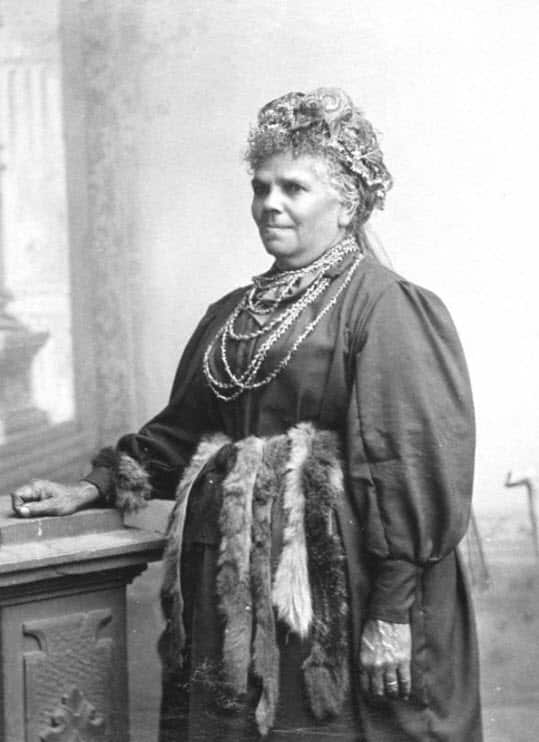The National Film and Sound Archive of Australia (NFSA) has announced the induction of the 1899-1903 Fanny Cochrane Smith Tasmanian Aboriginal recordings into the UNESCO Australian Memory of the World Register.
These are the only sound recordings of Fanny Cochrane Smith, the last fluent speaker of any one of the original Tasmanian Aboriginal languages. The cultural advocate and artist used her words and songs to provide a unique insight into Tasmanian Aboriginal society, and their cultural and spiritual life.
Manager Indigenous Connections NFSA and Wiradjuri woman, Tasha Lamb says preserving culture is vital for all Australians, not just Aboriginal & Torres Strait Islander peoples.
"Indigenous knowledges and culture has been shared by generations to generations for thousands of years. Without this culture of sharing and conserving these knowledges would disappear," she said.
"The preservation and revitalisation of Aboriginal and Torres Strait Islander languages in particular strengthens connection to culture which results in a positive impact on overall wellbeing."
“These recordings remind us why this is a vital task for our national cultural life. They prove the timeless power that recorded sound has, to connect us with our history."
Acting NFSA CEO Meg Labrum says this is an important moment in history.
“Almost 120 years after Fanny Cochrane Smith stood in front of a wax cylinder machine to capture her language and songs on that then-new technology,” she said.
“These invaluable recordings are taking their rightful place in the Australian Memory of the World Register.”
The NFSA exists to collect, preserve and share Australia’s audio-visual history.
“These recordings remind us why this is a vital task for our national cultural life. They prove the timeless power that recorded sound has, to connect us with our history,” Labrum said.
The recordings were added to the NFSA’s Sounds of Australia registry in its inaugural year, 2007, due to their cultural, historical and aesthetic significance.
The UNESCO Australian Memory of the World Program honours documentary heritage of significance for Australia and the world, and advocates for its preservation.
The recordings have provided a unique opportunity to assist in the development of a composite Tasmanian Aboriginal language. The Tasmanian Aboriginal Centre manages the Language Retrieval Program; using Fanny Cochrane Smith’s recordings and Aboriginal community oral history to construct 'Palawa Kani – Tasmanian Aborigines speak or talk'.
It is increasingly being used within the Tasmanian Aboriginal Community, and Palawa Kani is also being introduced to the wider public through the Aboriginal and Dual Naming Policy.
Who is Fanny Cochrane Smith?

Fanny Cochrane Smith made only known recordings of Tasmanian Aboriginal song and speech. Source: Twitter
These recordings, held on eight wax cylinders, were made by the Royal Society of Tasmania and Horace Watson, between 1899 and 1903. They are the only spoken record of any one of the original Tasmanian Aboriginal languages, as spoken and sung by their last surviving fluent speaker.
The importance of Language:
For Tasmanian Aboriginal people, the recordings provide a tangible connection to the voice of Ancestors. For Cochrane Smith's descendants the recordings also provide a legacy of cultural knowledge and a record of family oral history. They are among the earliest sound recordings ever made in Australia.
Lamb says the opportunity Smith was given to record her language and stories is so very special for her people.
"Her recordings are very powerful. Especially when you think about the era they were recorded when Aboriginal people were not even considered Australians," she said.
"Hearing Fanny Cochrane Smith’s voice is powerful for her people and is a tangible connection to the voice and memory of their Ancestor which represents the resilience and cultural continuity of the Tasmanian community."
"I know from personal experience when I heard a recording of my Great Great Aunty speaking our language – Wiradjuri it was a powerful moment for me and very emotional as hearing her speak our language was a validation to me of who I am. Wiradjuri."
Language is central to Aboriginal and Torres Strait Islander cultures. Language connects people to a place, culture and practices that people do. It is fundamental to how Indigenous Australians identify.
Lamb says loss of language means loss of identity.
"It is the voice of our Ancestors, our Grandmothers & Grandfathers. The importance of the revitalisation of Indigenous languages is vital to the continuation of our cultures," she said.
"Due to colonisation and past government policies we were denied to speak our languages which resulted in them not being spoken fluently for many years. Today, language revival is a priority for most Aboriginal & Torres Strait Islander people."
Lamb says every aspect of her life is influenced by herculture.
"I am a Wiradjuri Woman whose homelands are the Bogan River, Central West NSW. My culture is very important to me and my family. We have very strong cultural values and knowing our culture and our identity where we come from is very important," she said.
"I have my language, I have my culture, I know my homelands."



